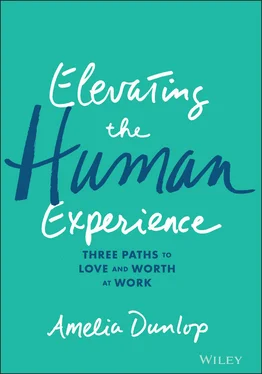Before we jump in, let's acknowledge the fact that just putting the words “love,” “worth,” and “work” together in a sentence feels risky and provocative. There are those who might believe work is nothing more than a means to a livelihood, not a place to find their worth. Equally, I imagine as I write these words that you may conjure images of inappropriate workplace relationships and be more than uncomfortable because we are talking about love and work in the same breath. We could use another word for “love.” We could talk about making another's experience better through respect or purpose. We could talk about care or well-being. But why should we? Why should we shy away from using the word “love” to describe our experience in the workplace? Why does it make us feel uncomfortable to consider loving our colleagues or our boss or being loved in return? We care for the people we work with and want to be cared for. Love is indeed present at work; we just don't feel comfortable talking about it.
I can only speculate as to the many reasons it is uncomfortable for most of us to talk about love at work. Here are some of mine. It makes me uncomfortable because, until quite recently, I had a distorted and monochromatic view of what “love” means. I thought it was reserved for my closest personal relationships, not for my professional persona. I thought, as a woman, using the word at work would instantly be viewed as feminine and weak. I thought that for a mother it might be seen as the opposite of smart, logical, and strong. I thought it would make it even harder to prove that I belonged at the table and should be taken seriously. And, worst of all, I thought talking about love and worth in the workplace would be a short walk to unwanted sexual advances and innuendo.
My male friends and colleagues have told me that it makes them uncomfortable to talk about love and worth at all, much less at work, because from a very young age—four or five years old—they were taught that it was not acceptable for a boy to show emotions. “Boys who cried or showed weakness were beaten, mocked, or both,” one male friend shared with me. And so, my friend concluded, it is not surprising that talking about love and worth at work feels as dangerous as the third rail. Anything that approaches the type of closeness that might be called love in the workplace is rife with potential danger, misinterpretation, and unnamed boundaries that might accidentally (or not so accidentally) be crossed. For him, and for many men like him, work is simply about “what needs to be done.” It is safer that way.
Equally, there are many who believe that a company exists primarily because of its ability to create a financial impact. If it did not create that impact, it would cease to exist. A company exists to create both a financial impact and a human impact, for the employees, customers, partners, shareholders, and broader community of stakeholders. What I argue is that every exchange in the workplace has two outcomes. One is the outcome of the transaction, which leads either toward greater or lesser financial profit. The second is the outcome of the human experience, which leads either to a better or worse impact for the humans. While never losing sight of the need for performance for a business to continue to exist, this book is focused on the impact of the human experience and the paths to love and worth in the workplace that ultimately contribute to better performance.
Why Elevating the Human Experience Is Necessary
I have come to believe that elevating the human experience is not only possible at work, but it is also necessary to fuel growth that leads to the joy of human flourishing for four reasons:
1 Elevating the human experience is necessary because the fundamental human condition is one of suffering.Every religious tradition, every culture, has its way of articulating the unmistakable fact of suffering through loss, craving, aversion, and distorted views of reality. Suffering doesn't know the boundaries of our personal or professional selves, so we bring our very human, suffering selves to work with us each day. Our suffering is exacerbated because we spend the majority of our waking hours not surrounded by our related and chosen loved ones, but rather we spend them at work. Collectively, in the US, we currently work more than any other culture at any other time in history. Working more, for many, can make us feel increasingly lonely and isolated. And yet, as our time spent working increases, our time spent in civic, neighborhood and religious institutions, which have traditionally provided a sense of meaning, purpose, and worth, has declined. The number of people who identify as atheist or having “no particular” religious affiliation has gone up from 17% in 2009 to 26% in 2019, according to Pew research. Prior generations, and other cultures, might well be mystified both that we spend so much of our lives working and that we expect our places of work to carry the weight of loving us and acknowledging our worthiness. Because suffering is inevitable, because suffering follows us to work and is exacerbated by our work, we can and ought to make the choice to make the experience of being human for each other and for ourselves, just a bit better.
2 Elevating the human experience is necessary because workplaces have exacerbated, if not created, the problems of burnout, lack of inclusion, lack of diversity, and lack of meaning and purpose.We talk about some of the problems we face at work in isolation, as though overwork leading to burnout and mental health issues; lack of meaning and purpose; bias on the basis of race, sex, age, or ability; and unethical irresponsible actions are unrelated to each other, when in fact these “work” problems are all different facets of the struggle to be recognized as worthy of love just for being human. We talk as though the experience of being treated well or treated poorly as a customer is fundamentally different from the experience of being treated well or poorly as a member of the workforce. When you see and love the whole person as worthy, there is no difference.
3 Elevating the human experience is necessary because it leads to more productive and creative outcomes at work.In our research, 84% of people said that they do their best work when they feel worthy.Workers who believe that their employer rates high in humanity, genuinely caring about their experience, are two and a half times more likely to be motivated at work, and one and a half times more likely to take on more responsibility than their peers.However, beyond increasing productivity, a focus on worthiness and love in the workplace creates the possibility for creativity and innovation. A well-publicized Google study in 2015 showed that the number one factor in the successful outcomes of teams was psychological safety, where teammates felt safe to take risks and be vulnerable in front of each other. In our own research, a similar theme emerged: people who felt loved or cared for by their boss felt as though they could take risks to try new things, which would not just produce more of their existing work, but create, innovate, and improve on their work. “Because I felt like he believed in me as a person, not just as a ‘worker,' I was more confident to try new, bolder things,” one woman we interviewed shared. For her, the benefits of elevating the human experience are as personal as they are professional.
4 Elevating the human experience is necessary because of what I call the intrinsic worthiness gap, the gap between how much it matters to us to feel worthy and how hard we struggle to do so.According to our proprietary research, 9 out of 10 people we surveyed agreed or strongly agreed that it matters to them to feel worthy, and yet 5 out of 10 people indicated that they sometimes, often, or always struggle to feel worthy.
Читать дальше












